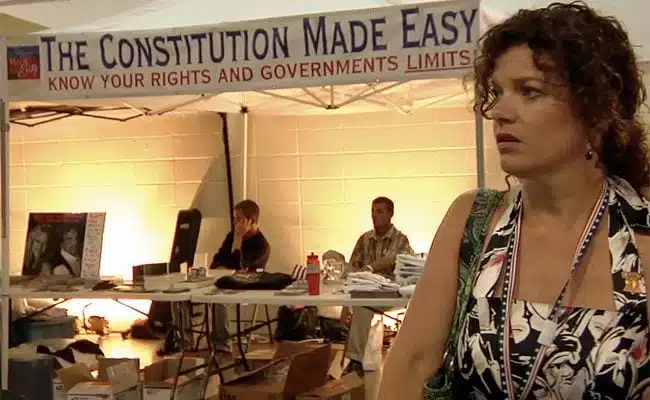
“You see all these people who are so angry about what’s going on right now. They haven’t gotten angry enough to turn it into action,” worries Katy Abram. “They almost need the government to walk in their front door and take their TVs and stuff.”
By contrast, as Abram explains at the start of the observational documentary Town Hall, she’s decided to take action, specifically in 2010, to campaign against Barack Obama so that he’s voted out of office in 2012. As she speaks, you see her in her office in Lebanon, Pennsylvania, that walls and windows are adorned with green-and-yellow “Americans for Prosperity” signage.
Sierra Pettengill and Jamila Wignot’s film doesn’t detail the organization‘s funding, its background, or its mission. Rather, it maintains a consistent focus on Abram, whose anger provides motivation and whose passion serves as a mandate. She’s angry, she says, at the nation’s economic instability, the rising debt, and the reckless spending by the federal government. As she tells Arlen Specter during a 2009 town hall, “I don’t want this country turning into Russia, turning into a socialized country.”
The moment was taped and instantly went, as they say, viral. The moment made Abram something of a star, a spokesperson for the anger she shares with so many other citizens.
And so, Town Hall–screening at the Doc Yard on 14 April and currently available on PBS online –reminds you, the angry Abram appeared on a series of TV channels, including Fox News and MSNBC. Brief TV clips layout the congealing sides: while Jon Stewart suggests Abram’s viral-video-reference to the US turning into Russia is “incredibly hyperbolic fear”, Sean Hannity commends her courage. On Hardball, she’s unprepared to answer Lawrence O’Donnell’s questions concerning exactly who will be paying additional “taxes” in the future she envisions.
In her car, speaking to the ride-along camera, she details the terrible threats she received on her cell phone and on social media. But if Abram didn’t ask for her public platform as a Tea Party activist, she goes on to use it, going to work for Americans for Prosperity and hitting the road with her boss, Jennifer.
While Abram finds her voice, urging other angry people to vote against the Democrats, Town Hall follows a parallel story, that of Tea Party activist John Stahl, a former businessman, now retired and looking after his elderly mother, Irene. Unlike Abram, who confesses that before she met her husband Sam, she was a “bleeding heart liberal” in favor of abortion rights and fond of Birkenstocks, John is a lifelong Republican, with a history of working polls on election days, traveling from place to place to hand out Tea Party brochures and explain the Tea Party’s positions.
While Abram describes her transformation, her discovery of her “true self” thanks to Sam’s conservative framework and the questions he asked her, the film shows Fox News and also offers Rush Limbaugh’s radio show as the soundtrack (“Mr. Obama, we don’t like anything you stand for!”), suggesting the influences that are reshaping her thinking, how she comes to abhor the “regulatory bullcrap” she sees in Obama’s policies, however vaguely.
By contrast, sort of, John reveals his story, the immediate pressures he’s feeling in order to take care of Irene (whom he helps to vote in 2010, from her wheelchair) and also imagines a future for himself. He fears not having the money to keep her at home, and dreads the specter of a nursing home.
His income as a retiree is fixed, as he’s using his Medicare payments and Social Security to pay for his mother’s care. Frustrated that he’s increasingly unable to manage her care at home, John, like other angry voters, finds a structure of resistance in the Tea Party, a set of code words and faith in generalized Constitutional principles.
He notes in passing that he’s been married three times, while the film pans from a Fox News broadcast on TV in the background. “Relationships and politics are very difficult things to do,” he says, “Especially if you’re an ideologue, you know.” At once self-aware and unable to sort out what to do next, John focuses on the hope of Romney’s win in 2012, even if he’s not the ideal Tea Party candidate.
John’s heartfelt investment in the Tea Party can hardly be questioned, but he doesn’t explain how he might get from here to there, only insists that the economy is bad and “immigrants” have ruined America, comparing them to another generation of population movement: “When the Europeans came over, they came at a rate where they could be Americanized,” John says,
“They prided themselves on how well they could keep their homes now not so much.” Near the film’s end, he chats with a couple of women from the Dominican Republic, outside a polling station, commends their efforts to be naturalized, then laments the strong turnout of Democrats he’s seeing in the precincts he’s monitoring.
Even as you know the outcome of the election and even if you might not share this “ideologue”‘s views, Town Hall invites you to empathize with the sense of vexation and search for answers pursued by Katy and John Abram. That’s not to say the film doesn’t take a position, for its use of conservative media imagery and sound certainly sets up a problem that cannot be solved here. But it does allow you to see how Katy and John might have come to feel as they do.

